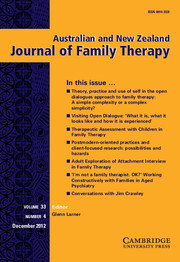Article contents
Key Systemic Ideas as Seen Through the Eyes of First-Year Trainees
Published online by Cambridge University Press: 02 March 2012
Abstract
This article offers an introduction to key systemic ideas as seen through the eyes of first-year trainees in a postgraduate systemic therapy course. Our aim is to present these ideas in user-friendly, accessible language, with examples to illustrate their use. The article is organised around three main themes: how a family system gets organised; how systemic work helps to effect change in families; and how a systemic therapist creates a context for change. Ideas covered include circular patterns, processes and questions, feedback loops, the importance of context, the interdependence of meaning and action, taking a meta-perspective, systemic hypothesising, neutrality, curiosity, second-order change, use of language and the position of the therapist. The article may be of particular interest to those who are new to systemic ideas, as well as for those involved in providing training in systemic practice.
- Type
- Articles
- Information
- Australian and New Zealand Journal of Family Therapy , Volume 30 , Issue 3 , 01 September 2009 , pp. 196 - 215
- Copyright
- Copyright © Cambridge University Press 2009
- 4
- Cited by


